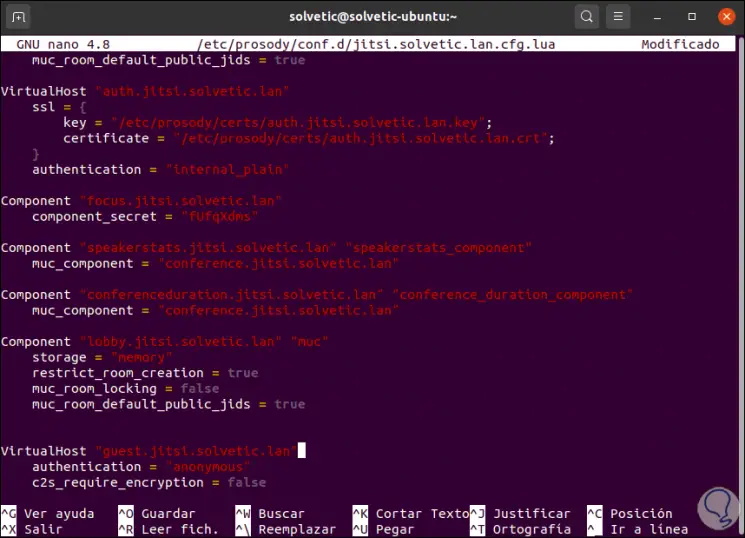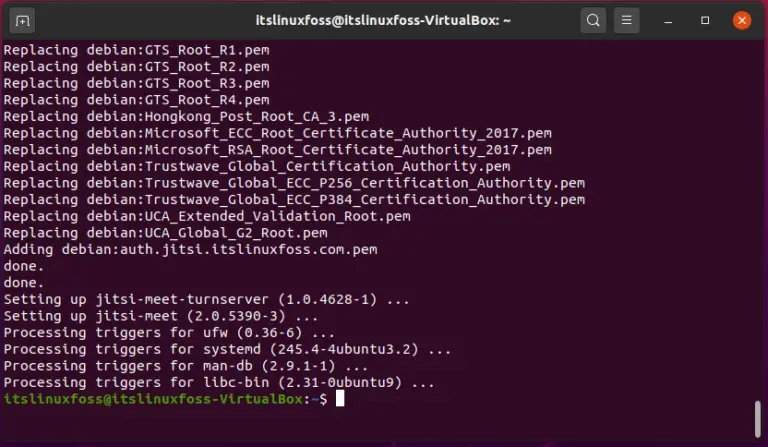

- UBUNTU JITSI MEET INSTALL HOW TO
- UBUNTU JITSI MEET INSTALL INSTALL
Note: You move the cursor from the hostname field to highlight the button with the TAB key. Run the following ufw commands to open these ports:ĭuring the installation of jitsi-meet you will be prompted to enter the domain name (for example, jitsi.your-domain) that you want to use for your Jitsi Meet instance.
4443/tcp,10000/udp used to transmit and receive the encrypted call traffic.  443/tcp used for the conference room creation web page. 80/tcp used in the TLS certificate request. The ports that you will open are the following: Also, the TLS installation process needs to have a port open so that it can authenticate the certificate request. The Jitsi server needs some ports opened so that it can communicate with the call clients. When you followed the Initial Server Setup with Ubuntu 18.04 guide you enabled the UFW firewall and opened the SSH port. In the next step, you will open the firewall ports that are needed by Jitsi and the TLS certificate installer. Your server now has the hostname that Jitsi requires for installation. Locally mapping the domain name to 127.0.0.1 makes it possible to use the TLS certificate for these local network connections. These connections are authenticated and encrypted with a TLS certificate, which is registered to your domain name. Mapping your Jitsi Meet server’s domain name to 127.0.0.1 allows your Jitsi Meet server to use several networked processes that accept local connections from each other on the 127.0.0.1 IP address. The following command will set the current hostname and modify the /etc/hostname that holds the system’s hostname between reboots: Jitsi Meet uses both of these settings when it installs and generates its configuration files.įirst, set the system’s hostname to the domain name that you will use for your Jitsi instance. In this step, you will change the system’s hostname to match the domain name that you intend to use for your Jitsi Meet instance and resolve that hostname to the localhost IP, 127.0.0.1. When more than two clients are present then call data is routed through the Jitsi Meet server. The jump in resource use between two and three participants is because Jitsi will route the call data directly between the clients when there are two of them. The following benchmark information was collected from a single-core virtual machine using high-quality video settings: When you are choosing a server to run your Jitsi Meet instance you will need to consider the system resources needed to host conference rooms. Throughout this guide, the example domain name jitsi.your-domain is used.
443/tcp used for the conference room creation web page. 80/tcp used in the TLS certificate request. The ports that you will open are the following: Also, the TLS installation process needs to have a port open so that it can authenticate the certificate request. The Jitsi server needs some ports opened so that it can communicate with the call clients. When you followed the Initial Server Setup with Ubuntu 18.04 guide you enabled the UFW firewall and opened the SSH port. In the next step, you will open the firewall ports that are needed by Jitsi and the TLS certificate installer. Your server now has the hostname that Jitsi requires for installation. Locally mapping the domain name to 127.0.0.1 makes it possible to use the TLS certificate for these local network connections. These connections are authenticated and encrypted with a TLS certificate, which is registered to your domain name. Mapping your Jitsi Meet server’s domain name to 127.0.0.1 allows your Jitsi Meet server to use several networked processes that accept local connections from each other on the 127.0.0.1 IP address. The following command will set the current hostname and modify the /etc/hostname that holds the system’s hostname between reboots: Jitsi Meet uses both of these settings when it installs and generates its configuration files.įirst, set the system’s hostname to the domain name that you will use for your Jitsi instance. In this step, you will change the system’s hostname to match the domain name that you intend to use for your Jitsi Meet instance and resolve that hostname to the localhost IP, 127.0.0.1. When more than two clients are present then call data is routed through the Jitsi Meet server. The jump in resource use between two and three participants is because Jitsi will route the call data directly between the clients when there are two of them. The following benchmark information was collected from a single-core virtual machine using high-quality video settings: When you are choosing a server to run your Jitsi Meet instance you will need to consider the system resources needed to host conference rooms. Throughout this guide, the example domain name jitsi.your-domain is used. UBUNTU JITSI MEET INSTALL HOW TO
You can learn how to point domains to DigitalOcean Droplets by following the How To Set Up a Host Name with DigitalOcean tutorial.
A domain name configured to point to your server. 
The following table will give you some idea of what is needed. The size of the server you will need mostly depends on the available bandwidth and the number of participants you expect to be using the server. One Ubuntu 18.04 server set up by following the Initial Server Setup with Ubuntu 18.04 tutorial, including a non-root sudo-enabled user.After you have created the conference room, any users can join, as long as they have the unique address and the optional password.īefore you begin this guide you’ll need the following: This is not ideal for a server that is publicly available on the internet so you will also configure Jitsi Meet so that only registered users can create new conference rooms. The default configuration allows anyone to create a new conference room.
UBUNTU JITSI MEET INSTALL INSTALL
In this tutorial, you will install and configure a Jitsi Meet server on Ubuntu 18.04. With Jitsi you can be sure that your private information stays that way.

The benefit of a Jitsi conference is that all your data only passes through your server, and the end-to-end TLS encryption ensures that no one can snoop on the call. A Jitsi Meet server provides multi-person video conference rooms that you can access using nothing more than your browser and provides comparable functionality to a Zoom or Skype conference call. Jitsi Meet is an open-source video-conferencing application based on WebRTC. The author selected the Open Internet/Free Speech Fund to receive a donation as part of the Write for DOnations program.








 0 kommentar(er)
0 kommentar(er)
